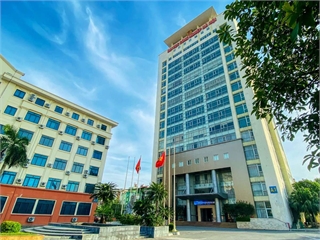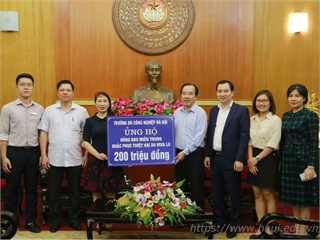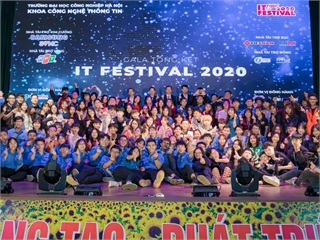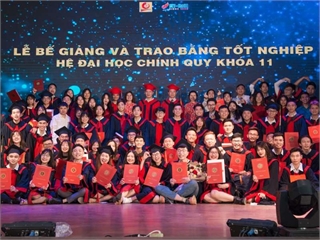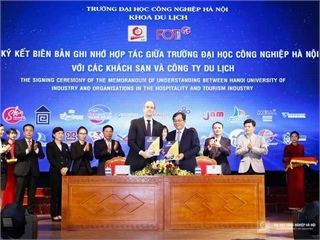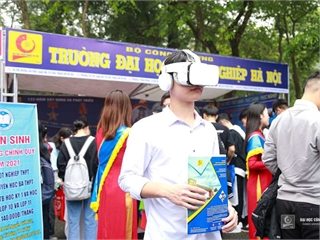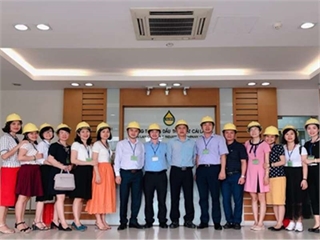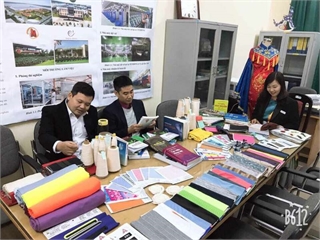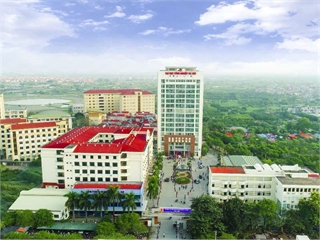University-Enterprise cooperation to train students before recruitment: An effective model at Hanoi University of Industry
Nguyen Van Thanh, Tran Viet Hoi - Center for Enterprise Partnership
1. Statement of the problem
Cooperation between universities and businesses to train human resources to meet the needs of the labor market is one of the important tasks for training institutions in general and universities in particular today. According to the 2019 Labor and Employment Survey of the General Statistics Office of Vietnam, the unemployment rate of workers with a bachelor’s degree or more education is relatively high, accounting for 14.9% of the total unemployed. This may result from the fact that graduates are unable to find a job that matches their demands and majors [1]. According to the graduating student employment survey from 05 universities in North, Central and South of Vietnam within the framework of the EV - EVENT Project, the average time for students to find a job after graduation was about 3 months and the main difficulty in finding a job is due to the lack of practical and professional experience [2]. Students take a fairly large amount of time to find and get used to a job after graduation, according to a study by the International Labor Organization (ILO). This is because the cooperation between universities and businesses is not really good, so businesses have to spend time and money on additional training from 3 to 6 months, leading to a waste of resources and time for both businesses and society. The Government’s policy on higher education development, as stipulated in Law 34/2018/QH14 on amendments to the Law on Higher Education, effective from July 1, 2019, clearly defines the promotion of cooperation between higher education institutions with enterprises, encouraging enterprises to participate in the training process, contributing to improving training quality [3]. However, in reality, enterprises only participate to a very limited extent in the training process of universities, such as receiving internships or recruiting when needed. Faced with the facts, a cooperation model between universities and businesses to train students with the missing knowledge based on the demands of the business needs to be researched and deployed to improve the quality of training, increase the rate of finding a job, and especially help graduates immediately participate in the production and business chains of enterprises. With a long tradition, Hanoi University of Industry has affirmed itself as one of the prestigious application-oriented education and training institutions in the country. The university has created win-win relationships with more than 2000 domestic and foreign organizations and businesses so far [4,5].
2. Deployment Process
Pre-employment training cooperation programs are developed and implemented by the university and businesses based on the requirements of businesses and the university's ability to respond with the participation of a team of technical experts from businesses and the university's lecturers from the input to the training process to the output of the program... The process is shown in Figure 1 below:
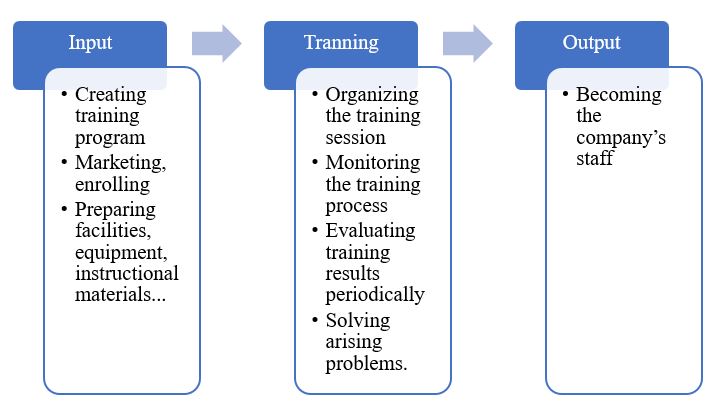
Figure 1. The process of implementing a pre-employment training cooperation program for students
Benefits of the pre-employment training cooperation program:
- For businesses: selecting quality human resources, developing talents based on students' capabilities, saving costs and time after recruitment; students after graduation have can respond immediately to work at the enterprise.
- For the university: improving training quality, enhancing integration; lecturers have access to modern equipment and machinery systems of enterprises through field trips; the number of grads has a job related to their major increased and at the same time enhancing the position of the University.
- For students: having clear career orientation from which to develop their intellect and passion for learning, getting financial support, accessing the business and production environment of enterprises and getting a suitable job right after graduation.
3. Results
With the experience gained through the implementation of international cooperation projects at Hanoi University of Industry such as the Project on Human Resource Development for Engineering at Hanoi University of Industry (JICA Project), the Project on Training Human Resources for Mechanical Precision Machining (HaUI Project - Foxconn),... along with the capacity of the lecturers and the system of advanced and modern facilities, the university has actively exchanged and cooperated with businesses to deploy many effective pre-employment training cooperation programs, bringing mutual benefits to the university, businesses and especially students. Cooperation programs have been regularly exchanged, reviewed and evaluated by interested parties to improve quality and expand and develop the model. Some typical pre-employment training cooperation programs are as follows:
3.1. Cooperation training program "Highly qualified engineers"
The program is the result of cooperation between Hanoi University of Industry, Nissan Automotive Technology Co., Ltd. and Pasona Tech Vietnam Co., Ltd. with the aim of developing talents, improving the quality of human resources to meet the needs of the companies and gradually put the actual knowledge and technical content of the enterprise into the training program.
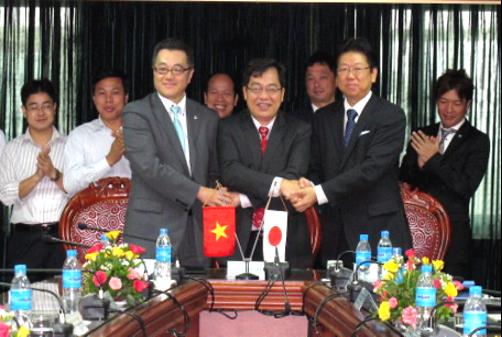
Figure 2. Signing a cooperation agreement to train highly qualified engineers with the companies
The program has been implemented since 2013, the students participating in the program are trained in Japanese, specializing in designing automotive components at the request of enterprises in parallel with the regular training at the university. They have about 3 months to be trained directly according to the production process at the companies. Students participating in the program get scholarships and are fully funded for training by the companies. At the end of the program, the students who graduate and complete the training program are recruited to work. Annually, about 70 students majoring in Mechanical, Electronics, Information Technology and Chemistry participate in the program.
3.2. Training program "Specialized engineers"
Hong Hai Science and Technology Group (Foxconn) is one of the largest electronics and component assembly groups in the world and has had cooperation projects with Hanoi University of Industry since 2008 to invest in facilities, equipment, machinery and training programs on mold processing at HaUI - Foxconn Technical Training Center. In order to further meet the needs of human resources in the era of the Industrial Revolution 4.0, Foxconn Group together with the university built a training program "Specialized Engineers" for 3rd and 4th-year students and has been recruiting and training since 2016.
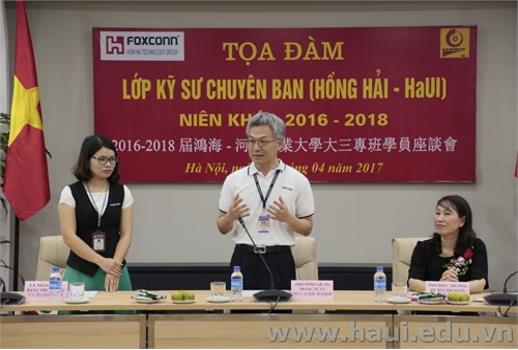
Figure 3. Leader of Hong Hai Science and Technology Group explain the Specialized Engineer program to students
Participating in the program, students are fully funded by Foxconn Group for Chinese language training, specialized training in accordance with the enterprise’s requirements, tuition fees for full-time training courses and semester-based encouragement scholarships. Students are also arranged training time directly on the production line of the enterprise according to the recruitment position and are paid as probationary employees. Every year, about 80 students participate in the program and are recruited to work at Hong Hai Science and Technology Group.
3.3. Internship and recruitment cooperation program “Samsung technical scholarship”
With the program "Samsung technical scholarship", the participants are college students of technical professions preparing to graduate internship. Samsung recruits students and trains them for 3 months at the company.
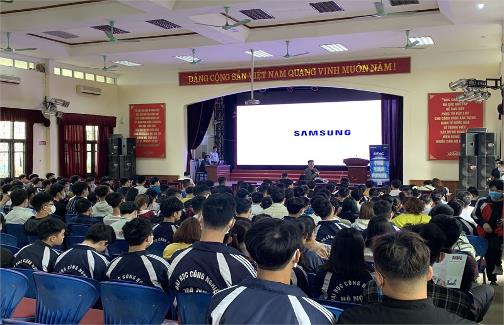
Figure 4. Students attending the introduction seminar of the Samsung technical scholarship program
The university cooperates with Samsung to jointly monitor, guide and evaluate the results of students participating in the program. Students get scholarships, get paid during 03 months of training at the company. Besides, they are recognized by the university for the graduation internship and officially recruited to work at Samsung after graduation. The program has been implemented by the university in collaboration with Samsung since 2015. The number of students who are granted is based on the company's annual needs. In 2017, there were nearly 600 students participating in this program.
3.4. Cooperation program to recruit and train students to work in Japan
In addition to cooperation programs to train students before recruiting to work at domestic companies, the university cooperates with businesses in Japan to train and directly recruit students to work in Japan.

Figure 5. The university’s delegation visits the place where students work in Japan
After passing an exam to test knowledge, skill and attitude from the enterprises, students are selected to participate in the program and are trained in Japanese, culture and work skills. After the training course, students who meet all the requirements would go to Japan to work and receive a salary like a Japanese. All training costs and procedures to work in Japan are paid by the enterprises. Every year, more than 100 students participate in the program, some typical enterprises cooperate in training and directly recruit students to work in Japan include Minami Fuji, O-OKA, Revo, Clay Vietnam…
4. Some solutions to improve the effectiveness of the pre-employment training cooperation program for students
In order to continue to maintain the effectiveness and replicate the model of cooperation in pre-employment student training, a number of solutions suitable for the new period are proposed for training institutions as follows:
- Strengthening communication and promotion of the program to businesses in the process of contacting and meeting; widely introduced to freshman and second-year students about the program in order to have orientation, selection and preparation of necessary conditions when participating.
- Creating good conditions in terms of facilities, strengthening coordination between units in the university in managing and supporting students, promptly solving difficulties and problems for students participating in the program.
- Researching and putting the training content of enterprises into the main training program; coordinating between the university and enterprises to assign topics and graduation projects associated with the student's job position at the enterprise, helping students both complete the project and broaden their knowledge and skills at the enterprise.
5. Conclusion
It can be said that the cooperation program to train students before recruitment is a cooperation model that shows the cohesion and companionship between the university and enterprises in training high-quality human resources to meet the needs of the labor market. In order to maintain and develop the necessary pre-employment cooperation programs, it requires the active participation of both the university and enterprises while strengthening the support and supervision in the implementation process so that all the students can complete the program and enter the official work at the enterprises. On the basis of the achieved results, the university is gradually continuing to research, improve the program, develop and expand it for freshman and second-year students, towards the model of school-enterprise cooperation to jointly design and deploy formal training courses according to the orders of enterprises.
References:
[1] Tổng cục Thống kê “Báo cáo Điều tra lao động việc làm năm 2019”.
[2] Dự án EV – EVENT ‘’Việc làm và gia nhập thị trường lao động của sinh viên Việt Nam sau khi tốt nghiệp’’ – NXB ĐHKTQD, 2020.
[3] Luật số 34/2018/QH14, Luật sửa đổi, bổ sung một số điều của Luật giáo dục Đại học có hiệu lực từ ngày 01/7/2019 của Quốc hội Việt Nam, 2018
[4] https://www.haui.edu.vn/vn/goc-nhin-haui/hop-tac-nha-truong-doanh-nghiep-gop-phan-nang-cao-chat-luong-nguon-nhan-luc-trong-thoi-ky-cach-mang-cong-nghiep-4-0/.
[5] http://tsc.edu.vn/tin-tuc/-/content/1046433/hoi-thao-khoa-hoc-mo-hinh-du-bao-nhu-cau-dao-tao-trinh-do-dai-hoc-nhom-nganh-ky-thuat-cong-nghe-den-nam-2025-tam-nhin-den-nam-2030-tai-viet-nam/
-
Wednesday, 10:18 27/10/2021
